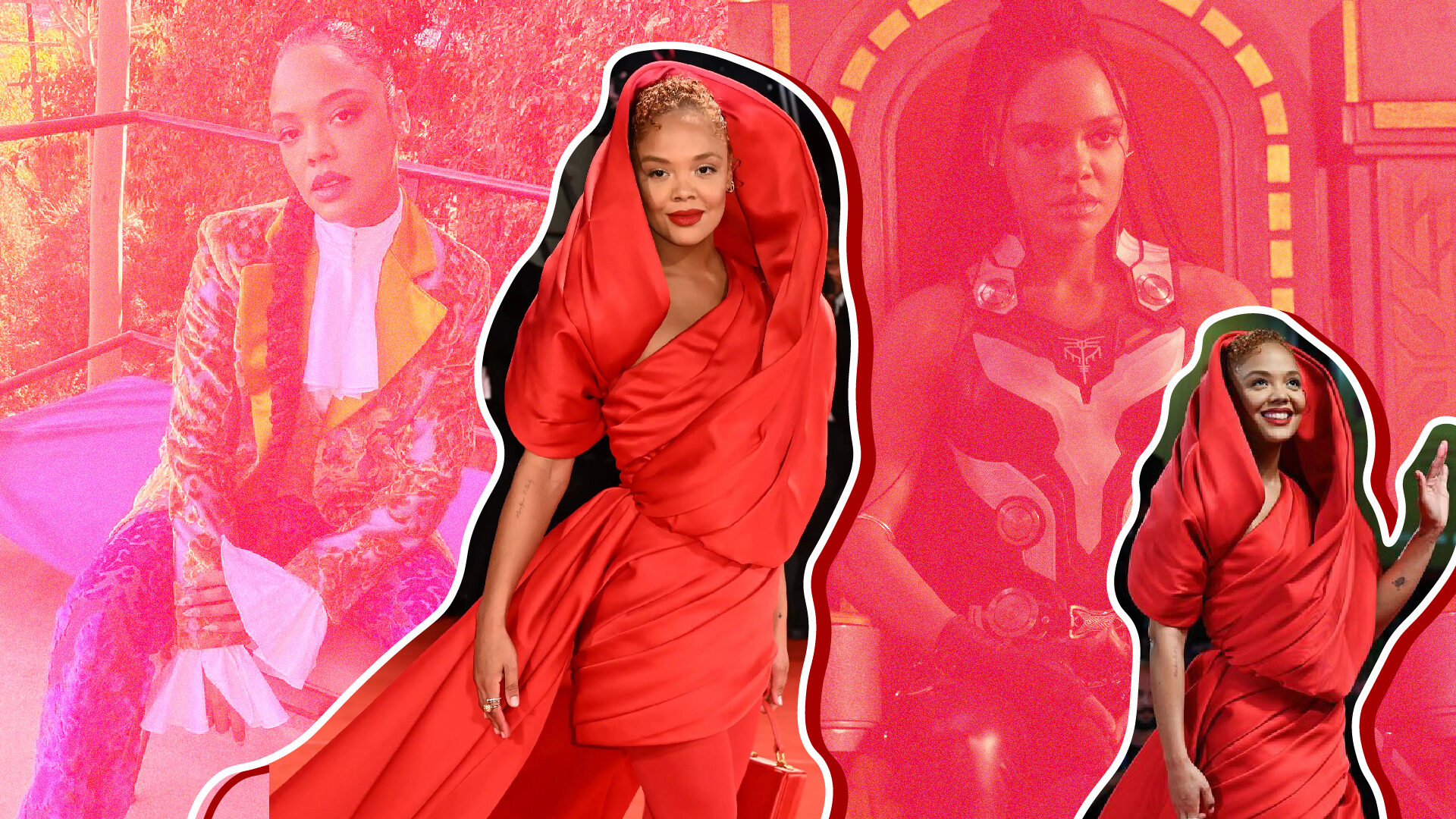
There’s an enamor that is instinctual when watching Tessa Thompson on screen. No matter the role she assumes the power of articulating the subtleties of her character with poise and dexterity. In Creed, she delves into the nuances of unconditional love; she understands how to make her villainy in HBO’s Westworld captivating; and as King Valkyrie in the Marvel Cinematic Universe (MCU), she reckons with the gender-coding of leadership. Thompson knows the indelible purpose in every portrayal, executes the challenge, and nudges the standards further.
Offscreen, Thompson gleams even more. She’s rightfully vocal about the underbelly of representation in Hollywood, the #MeToo movement’s ability to shift power dynamics, and how the queer community can forge a space in cinema. How could anyone not become besotted by her Libra ability to remain gracefully honest? Ahead are a few of the reasons Girls United has entered the Tessa Thompson standom forever.
The time we met her in Dear White People
In the 2014 premiere of Dear White People, we were fascinated with Thompson’s distinct enigma through the character of Samantha, a civically engaged student wading through racial tensions at a fictitious, predominantly white Ivy League college. While the film poignantly translated the existence of Black students in white academic spaces with hilarity, its acclaimed debut became an affirmation of Thompson’s imminent ascension.
“It changed the game for me,” she revealed. Before landing a role in the film, Thompson wrestled with the earmarks assigned to roles of Black womanhood in Hollywood. “Why do we only have to be the sassy black friend? It was incredible to be able to talk about the frustration that I’d had in this industry, in a film. And then it did so well. So that became my North Star.”
Her exploration of queerness in the Marvel Cinematic Universe
The release of Thor: Ragnarok in 2017 introduced Valkyrie — a valiant companion to the titular Norse god — as the first openly queer Marvel superhero. As staunch fans of the franchise rallied for her storyline to involve the romantic quests that hetero-characters amply receive, Thompson advocated for the Asgardian leader to be explored in her entirety in the recently-released Thor: Love and Thunder.
“I think there’s a lot of folks that are righteously very hungry for that representation to exist in these movies, as am I. But I also think [it’s important] not to hang the character’s hat solely on her sexual identity just because she’s a queer character,” Thompson told LA Times. Across the silver screen, the inclination to pursue queer storytelling often manifests as inaccurate, one-dimensional depictions. “I think that’s one way of minimizing her humanity, actually, if that’s the only facet that you get to explore her in.”
Her dynamic advocacy for the LGBTQ+ community
Thompson coming out in 2018 as sexually fluid, in an interview with Porter, was a transformative decision for her. With a towering platform, the actress admitted pondering on the delicate responsibility and the public’s intrusiveness that would trail such a declaration. Now, she revels in the insurmountable impact she has on her supporters who can see themselves reflected in her image. In conversation with Variety, she said, “I’ve had so many folks write me and say that they were able to come out or to talk to their family, which is a dream.”
The time her boundless style commanded the Venice Film Festival
Innovation and diversified silhouettes hallmark the storied evolution of Thompson’s style. She’s experimented with structured metallic pieces, tempted us with moody stylistic illusions and even rocked braided cowboy hats to the Met Gala. So there’s no surprise the actress wore a glaring neon green set hailing from the craftsmanship of Christopher John Rodgers to the 79th Venice International Film Festival. With a corset bodice sumptuously contrasted with a ruched maxi skirt and chunky platform heels underneath, she continues to cement herself as a fashion icon.
Her captivation Black joy in Sylvie’s Love
In a sociopolitical climate that amplified the erasure of Black triumph and comfort in film, Thompson played in the 2020 Eugene Ashe-directed project Sylvie’s Love. As the titular character, Thompson wondrously depicts the essence of transcendental love through the setting of Harlem in the 50s.
“At a time when we’re talking about the value and dignity of Black life…it’s really great to have a [love] story that offers some escapism for audiences, and that feels sweeping and beautiful and hopeful about love,” she said to ESSENCE for the December 2020 digital cover story that centered the film. “We really need those kinds of narratives.”
About Mia: Mia Uzzell is a culture documentarian covering Black womanhood with bylines in Glamour, Teen Vogue, Grazia USA, and more. You can keep up with her discourse surrounding the intersection of race and gender on Instagram @originalmiadiamond